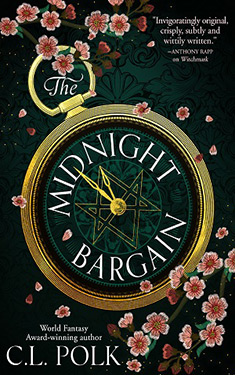CL Polk
Completed 5/26/2021, Reviewed 5/26/2021
3 stars
I was a little disappointed in this book. It’s good, but didn’t knock my socks off like Witchmark and the other books of the Kingston Cycle. It’s a regency romance with magic, a fairly common trope, but this one more or less hits you over the head with its message about women fighting the suppression of their magical abilities by men. It was a pleasant read that didn’t really take off until the end, which unraveled at a frantic pace. This book was nominated for a Nebula, but would not be my pick.
The story follows Beatrice Clayton, a young woman who has come to the city with her family for the bargaining season, that is, when all the young women of marrying age make their rounds at parties and other social gatherings to find a husband. The trouble is, Beatrice doesn’t want to marry because it means that she must forgo her magic, since the fetus of a sorceress is usually possessed by a spirit before it gets its soul, creating an abomination. The result is that the baby and the woman are burned at the stake. To prevent this, women must wear silver necklaces, not unlike slave yokes, to cancel out their talents and protecting the baby.
Beatrice wants to be a full-fledged mage, but is obligated to marry to provide her indebted family with a dowry to return them to solvency. Then she meets Ianthe Lavan and his sister Ysbeth. Ysbeth too wants to be a mage and never marry. The two young women join forces with a grimoire that explains how to be a mage without the help of the men’s magic society. Ianthe helps as well, and as you might guess, he and Beatrice fall in love. So she must decide what it will be, marriage and the yoke, or magic with the societal scandal and the ruin of her family.
The characters are all really well-developed and interesting. Beatrice, Ysbeth, and Ianthe are the main characters. Their interactions and dialogue are realistic. I empathized with all three. There is a fourth character, Harriet, Beatrice’s fifteen-year-old sister. She is well-done as well, but her character is really annoying, as a fifteen-year-old might well be. She is aghast at Beatrice’s behavior, for if the family goes into financial ruin, she would have no hope whatsoever of having her own bargaining season. And of course, this being a regency England-styled world, a woman’s most important job is catching a man. A lot of her dialogue is simply cringeworthy, not because it’s bad writing, but because it’s so accurate to the world Polk builds. But this awareness did not make me like Harriet any better.
The secondary characters are rather cardboard: the long-suffering mother of Beatrice who wears the yoke, the single-minded father, the ruthless Lavan matriarch who wants her son to marry higher, and the myriad of suitors, some kindly and some foul. The one other character I did like was the lesser spirit of luck whom Beatrice conjures to help her through the season. It’s playfully devious and very likeable. I enjoyed its obsession with throwing hexes to help Beatrice. It kind of reminded me a little of Grr from the “Invader Zim” cartoon from about fifteen years back. It’s a little naïve, fun, and dangerous.
The world building was quite good, borrowing from regency England and throwing in magic. It’s done consistently and believably. I had no trouble buying into it. My trouble was that the first two-thirds of the book is unremarkable, from Beatrice and Ysbeth’s desire to break the mold cast for women in society to her relationship with Ianthe. It all felt like it had been done before and more interestingly.
I give the book three stars out of five. It’s a pleasant read, but just doesn’t compare to the excitement of Polk’s Kingston Cycle. I look forward to future books by Polk. I think she’s a very good writer and has some excellent ideas. I think I’m just tired of the regency thing.

No comments:
Post a Comment